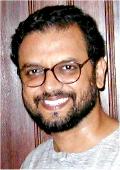The Independent Newsweekly
| National
Catholic Reporter
The Independent Newsweekly |
| Global Perspective |
| January 22, 2004 |
Vol.
1, No. 41
|

Fr. Francis Gonsalves is a Jesuit in the Gujarat Province, India. He lectures in systematic theology at Vidyajyoti College of Theology, Delhi, and has published many articles on theology, spirituality and social justice. |
Making A 'Mother World' PossibleBy Francis Gonsalves, S.J. MUMBAI, India -- "Another world is possible" was the slogan that united more than a hundred thousand participants from more than a hundred countries at the World Social Forum 2004 (WSF) held in Mumbai from January 16 to 21, 2004.
A safer world
Blair's lying to Britishers that Iraq had weapons of mass destruction angered doctors Kamzai Boomla and Anne Livingstone. "Where are those weapons?" they queried. "Bush and Blair must face charges for crimes against humanity." Japanese and Koreans expressed concern over increasing US stockpiling of arms across their borders. "I have come here to tell the USA that we do not need protection," said Moon Sang In from South Korea who wonders what can be done to rebuild Iraq. The Tibetan and Palestinian issues received great sympathy. A secure world
Iranian Nobel peace laureate, Shirin Ebadi, painted a bleak picture of human rights' violations that affect the weaker sections of society: women, children, aboriginals, minorities, and other poor. Many speakers exposed the nexus between globalization and fundamentalisms. Dipak Dabhi and Praveen Gamit, activists in the Indian state of Gujarat bemoaned that transnational corporations, politicians and religious fanatics not only colluded in the '2002 Gujarat genocide' against the Muslim minority but continue efforts to hide evidence and peddle lies to the public. A shared world
Colombian Hildebrando Velez Galeano too is critical of neo-liberalism. "Colombia faces acute problems due to consumerism and a polarization between a few rich and the majority poor," he said. There is increased awareness that promises about a "global community" are pipe dreams since large sections of the world's poor suffer greater marginalization than ever before. "The only community that is flourishing today is the centralized community of capitalists who are united in plundering the planet," warned Egyptian academician Samir Amin. Without people's participation and formation of truly human communities, there can be no justice, no peace, Amin said. A sacred world
"The rural sector is threatened by the privatization of water resources and the production of genetically engineered seeds," complained Gloria Compte from Barcelona. Discontent with globalization is not limited to the struggling South but affects rich countries too. An exhausted Trent Schroyer, professor of ecology, economics, and ethics expressed a foreboding of rampant "evil" that plagues the United States. "Many Americans experience a spiritual void in our secularized world," said Schroyer. He felt that a sense of the sacred should sustain societies, and regarded India "not merely as a nation, but a spiritual civilization lighting up paths to spirituality." A sensitive world
Justine Nkurunziza of Burundi who campaigns for the rights of AIDS patients expressed concern about increasing intolerance among people. "The Christian churches, too, are insensitive to the needs of the victims of society," she said. Her statement struck me. And stuck. Whither WSF?
I went unaccompanied to the World Social Forum, although fellow Jesuits of South Asia mobilized more than 1,500 victims of various regions. In encounters with global citizens I introduced myself as "lecturer, researcher, journalist, social activist," and occasionally as "Jesuit." I was aware of the Society of Jesus' 34th General Congregation's mandate (decree 3, no. 52): "We intend to journey towards ever fuller integration of the promotion of justice into our lives of faith, in the company of the poor and many others who live and work for the coming of God's Reign." Many church dignitaries pooh-poohed the World Social Forum (and the Mumbai Resistance). Justine, the Burundi activist's criticism hurts. The Bible traces peoples' movements from Babel to Pentecost where one Spirit-filled speech was intelligible to a hundred diverse peoples. The World Social Forum and the Mumbai Resistance engendered a thousand protesting, prophetic voices. Sri Lankan Jesuit Paul Casperz said, "Another world is truly possible - a 'mother world.'" Can Christians worldwide help create a "mother world" wherein every person will feel safe, secure, supported and suckled by mother earth and sensitive to the needs of all others? Editor's Note: This story was first posted on NCRonline.org Jan. 21 as a breaking news story. |
| Copyright
© 2003 The National Catholic Reporter Publishing Company, 115
E. Armour Blvd., Kansas City, MO 64111
TEL: 1-816-531-0538 FAX: 1-816-968-2280 |